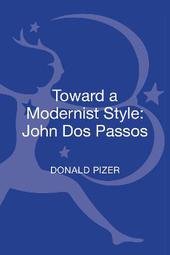
|
Toward a Modernist Style: John Dos Passos
Hardback
Main Details
| Title |
Toward a Modernist Style: John Dos Passos
|
| Authors and Contributors |
By (author) Professor Donald Pizer
|
| Physical Properties |
| Format:Hardback | | Pages:160 | | Dimensions(mm): Height 216,Width 140 |
|
| Category/Genre | Literary studies - from c 1900 -
Literary studies - fiction, novelists and prose writers |
|---|
| ISBN/Barcode |
9781623564438
|
| Classifications | Dewey:813.52 |
|---|
| Audience | | General | | Tertiary Education (US: College) | | Professional & Vocational | |
|---|
| Illustrations |
10 color illustrations 3 b&w illustrations
|
|
Publishing Details |
| Publisher |
Bloomsbury Publishing Plc
|
| Imprint |
Bloomsbury Academic USA
|
| Publication Date |
19 December 2013 |
| Publication Country |
United States
|
Description
A new appraisal of Dos Passos's work and life, Toward a Modernist Style describes both the central currents in his early work, and his full participation in literary modernism, culminating in his U.S.A. trilogy, as well as the relationship of these currents to those of an especially vibrant period in American expression. Donald Pizer charts the evolution of Dos Passos's artistic sensibility from its largely conventional expression at the start of the 1920s to the radical formal experimentation of U.S.A. at its close. He places this development in Dos Passos's writing in the context of contemporary ideas about art and society. Pizer also looks at the important roles that Dos Passos's expatriation and his relationship with Ernest Hemingway played in his work as well as his efforts as a painter and their relationship to his literary art. Toward a Modernist Style is both an incisive guide to a major American modernist as well as an exploration of the wider currents that created literary modernism in the early twentieth century.
Author Biography
Donald Pizer is the Pierce Butler Professor of English Emeritus at Tulane University, USA. He is the editor of 11 books, including The Novels of Theodore Dreiser: A Critical Study (1976), Dos Passos' U.S.A.: A Critical Study (1988), and American Expatriate Writing and the Paris Moment: Modernism and Place (1996) and the editor of 22 books, including Three Soldiers by John Dos Passos, edited with an introduction, a Signet Classic (1997). His awards and honors include a Guggenheim Fellowship, a Fulbright Lectureship (University of Hamburg) and a National Endowment for Humanities Fellowship.
ReviewsDonald Pizer is not only a consistently reliable guide to the literature of John Dos Passos, he offers an unmatched depth of critical understanding. Pizer digs to the heart of the matter, focusing squarely on Dos Passos and his world, too sure of himself and his method to need flourishes of this year's critical theory for support. This volume shows Pizer at this best, shining the brightest light on his subject. -- Richard Layman, President, Bruccoli Clark Layman, and Editor Director, The Dictionary of Literary Biography Pizer is one of the best known-and admired-scholars of Dos Passos's work. Toward a Modernist Style is a series of intelligent essays about this major American writer. It is not exactly a reassessment of Dos Passos's work, but it adds to our understanding and expands our view of him as a modernist writer. If I were a student or scholar studying Dos Passos, or twentieth-century American literature and culture, I would want to read this. -- Townsend Ludington, Boshamer Professor Emeritus of English and American Studies, University of North Carolina at Chapel Hill, USA, author of John Dos Passos: A Twentieth-Century Odyssey Pizer's new collection complements and expands the scope of the scholar's earlier work on Dos Passos's most important novels and their radical innovations in narrative form. These insightful essays place the writer's work-writing and painting-into interdisciplinary contexts and connect it to the intellectual and cultural ferment of the 1920s and the expatriate community in which Dos Passos played an integral role as a leading modernist. -- Lisa Nanney, author of John Dos Passos Revisited
|